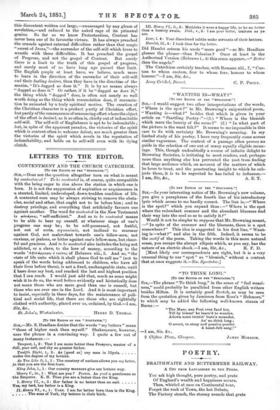[TO TEE EDITOR OP THE " SPECTATOR. "]
-S111,—Mr. S. Headlam denies that the words " my betters " mean -" those of higher rank than myself." Shakespeare, however, uses the phrase in a convincing way. I quote a few out of
many instances :- Tempest, i., 2 : That I am more better than Prospero, master of a /full, poor cell, and thy no greater father.
Twelfth Night, i., 3: As [good as] any man in Elyria under the degree of my betters.
As You Like It, i., 1 : The courtesy of nations allows you my better, in that yon are the first-born.
_Xing John, 1, 1: Oar country manners give our betters way.
'Henry V., iv., 1 : What are you ? PISTOL. As good a gentleman as the Emperor. K. H. Then you are a better than the King.
I. Henry VI., v., 5 : Her father is no better than an earl yes, my lord, her father is a King.
:II. Henry VL, v., 1: YORK. I am far better born than is the King. . . . The sons of York, thy betters in their birth. III. Henry VI., ii., 5: Methinks it were a happy life, to be no better than a homely swain. Ibid., v., 5: I am your better, traitors as ye are.
Lear, i. 4: Your disordered rabble make servants of their betters. Hamlet, iii., 4: I took thee for thy better.
Did Hamlet esteem his uncle " more good "—so Mr. Headlam glosses the phrase—than Polonius P Once at least in the
Authorised Version (Hebrews i., 4) this sense appears,—"Better than the angels."
The Catechism certainly teaches, with Romans xiii., 7, "Cus- tom to whom custom, fear to whom fear, honour to whom hononr."—I am, Sir, &c.,


































 Previous page
Previous page